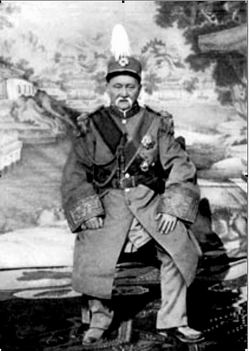<Back to Index>
This page is sponsored by:
PAGE SPONSOR

Ma Fuxing (1864 – 1924) was a Hui born in Yunnan, in Qing dynasty China. He was an ex-convict. During Yang Zengxin's reign in Xinjiang, Ma was appointed as a military commander, and then Titai of Kashgar.
Ma Fuxing served as a general for the Qing dynasty. He joined the Kansu Braves during the Boxer Rebellion, under the command of general Ma Fulu and battled against the foreign forces during the Siege of the International Legations (Boxer Rebellion) and Battle of Peking.
After the fall of the Qing dynasty, he started working for Yang Zengxin and recruited Dungan troops for him in 1911, and was posted in 1916 to Kashgar. In 1924 Yang intercepted some correspondence between Ma and the Zhili clique and became suspicious.
Ma Fuxing was appointed as the commander of 2,000 Hui soldiers by Yang Zengxin.
His reign was notorious for its repressiveness and his excesses. Ma Fuxing kept a harem of Uighur wives, and a hay cutting machine for severing the limbs of his victims. The limbs were put on display along with notices on why they were severed on the city walls. He also established government monopolies over industries such as petroleum, and made people purchase paraffin wax. Ma Fuxing also demanded that people call him padishah, which meant king.
Yang Zengxin decided that Ma's excesses were too great,
and sent Ma Shaowu, another Hui military
commander, to attack and replace him.
Ma Shaowu attacked Ma Fuxing, and then personally executed
him by shooting him after receiving a telegram from Yang
Zengxin. Ma Fuxing's body was tied to a cross to be put on
display.
Ma Shaowu then was appointed Daotai
of Kashgar.
Ma Haiyan (1837 – 1900) was a Chinese Muslim General of the Qing Dynasty. Originally a rebel, he defected to Qing during the Dungan revolt and helped crush rebel Muslims.
He was the father of Ma Qi and Ma Lin and of Ma Feng.
Dong Fuxiang, Ma Anliang and Ma Haiyan were originally called to Beijing during the First Sino-Japanese War in 1894, but the Dungan Revolt (1895) broke out and they were subsequently sent to crush the rebels.
During the Hundred Days' Reform in 1898 Dong Fuxiang, Ma Anliang, and Ma Haiyan were called to Beijing and helped put an end to the reform movement along with Ma Fulu and Ma Fuxiang.
He fought against the foreign Eight Nation Alliance in the Boxer Rebellion with his nephew Ma Biao serving under him, besieged the Catholic Xishiku Cathedral and the legations, and defeated the Alliance at Battle of Langfang, and died of exhaustion while he and the Kansu Braves were escorting the Imperial family to safety. His son Ma Qi took over his posts.
Ma Biao was the eldest son of Ma Haiqing, who was the sixth younger brother of Ma Haiyan, the grandfather of Ma Bufang. Ma Haiyuan was the seventh younger brother of Ma Haiyan, father of Ma Guzhong and Ma Bao, and grandfather of Ma Zhongying.